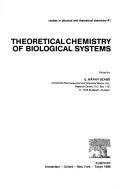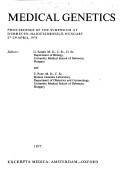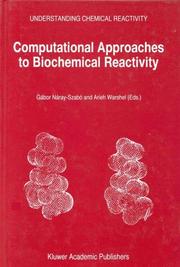| Listing 1 - 10 of 19 | << page >> |
Sort by
|
Book
ISBN: 9783631568514 Year: 2008 Publisher: Frankfurt am Main ; New York : Peter Lang,
Abstract | Keywords | Export | Availability | Bookmark
 Loading...
Loading...Choose an application
- Reference Manager
- EndNote
- RefWorks (Direct export to RefWorks)
English language --- Item response theory. --- Examinations.
Book
ISBN: 3319099760 3319099752 Year: 2014 Publisher: Cham : Springer International Publishing : Imprint: Springer,
Abstract | Keywords | Export | Availability | Bookmark
 Loading...
Loading...Choose an application
- Reference Manager
- EndNote
- RefWorks (Direct export to RefWorks)
In this volume, a detailed description of cutting-edge computational methods applied to protein modelling as well as specific applications are presented. Chapters include: quantum mechanical calculations on small protein models, the application of Car-Parrinello simulations to enzyme mechanisms, recent development of QM/MM methods, polarizable force fields, protein electrostatics, coarse-grained models, structure prediction of transmembrane proteins, molecular dynamics related to NMR spectroscopy, ligand docking, finite element methods for proteins as well as absorption-distribution-metabolism-excretion-toxicity prediction based on protein structures. An emphasis is laid on the clear presentation of complex concepts, since the book is primarily aimed at Ph.D. students, who need an insight into up-to-date protein modelling. A large number of descriptive, colour figures will allow the reader to get a pictorial representation of complicated structural issues.
Biochemistry. --- Pharmacology. --- Drug effects --- Medical pharmacology --- Medical sciences --- Chemicals --- Chemotherapy --- Drugs --- Pharmacy --- Biological chemistry --- Chemical composition of organisms --- Organisms --- Physiological chemistry --- Biology --- Chemistry --- Physiological effect --- Composition --- Chemistry. --- Chemistry, Organic. --- Theoretical and Computational Chemistry. --- Protein Science. --- Organic Chemistry. --- Organic chemistry --- Physical sciences
Digital
ISBN: 9783319099767 Year: 2014 Publisher: Cham Springer International Publishing
Abstract | Keywords | Export | Availability | Bookmark
 Loading...
Loading...Choose an application
- Reference Manager
- EndNote
- RefWorks (Direct export to RefWorks)
In this volume, a detailed description of cutting-edge computational methods applied to protein modelling as well as specific applications are presented. Chapters include: quantum mechanical calculations on small protein models, the application of Car-Parrinello simulations to enzyme mechanisms, recent development of QM/MM methods, polarizable force fields, protein electrostatics, coarse-grained models, structure prediction of transmembrane proteins, molecular dynamics related to NMR spectroscopy, ligand docking, finite element methods for proteins as well as absorption-distribution-metabolism-excretion-toxicity prediction based on protein structures. An emphasis is laid on the clear presentation of complex concepts, since the book is primarily aimed at Ph.D. students, who need an insight into up-to-date protein modelling. A large number of descriptive, colour figures will allow the reader to get a pictorial representation of complicated structural issues.
Chemical structure --- Organic chemistry --- Chemistry --- General biochemistry --- Computer. Automation --- organische chemie --- protein-engineering --- biochemie --- chemie --- informatica --- eiwitten --- moleculaire biologie --- enzymen

ISBN: 0444425977 Year: 1986 Publisher: Amsterdam New York Tokyo Elsevier
Abstract | Keywords | Export | Availability | Bookmark
 Loading...
Loading...Choose an application
- Reference Manager
- EndNote
- RefWorks (Direct export to RefWorks)
Article
Abstract | Keywords | Export | Availability | Bookmark
 Loading...
Loading...Choose an application
- Reference Manager
- EndNote
- RefWorks (Direct export to RefWorks)
HONGRIE --- COOPERATIVE AGRICOLE --- LEGISLATION --- HONGRIE --- COOPERATIVE AGRICOLE --- LEGISLATION

ISBN: 0444900020 Year: 1977 Publisher: Amsterdam : Excerpta medica,
Abstract | Keywords | Export | Availability | Bookmark
 Loading...
Loading...Choose an application
- Reference Manager
- EndNote
- RefWorks (Direct export to RefWorks)
Book
ISBN: 3319554867 3319554859 Year: 2017 Publisher: Cham : Springer International Publishing : Imprint: Springer,
Abstract | Keywords | Export | Availability | Bookmark
 Loading...
Loading...Choose an application
- Reference Manager
- EndNote
- RefWorks (Direct export to RefWorks)
This book collects research papers on the philosophical foundations of probability, causality, spacetime and quantum theory. The papers are related to talks presented in six subsequent workshops organized by The Budapest-Kraków Research Group on Probability, Causality and Determinism. Coverage consists of three parts. Part I focuses on the notion of probability from a general philosophical and formal epistemological perspective. Part II applies probabilistic considerations to address causal questions in the foundations of quantum mechanics. Part III investigates the question of indeterminism in spacetime theories. It also explores some related questions, such as decidability and observation. The contributing authors are all philosophers of science with a strong background in mathematics or physics. They believe that paying attention to the finer formal details often helps avoiding pitfalls that exacerbate the philosophical problems that are in the center of focus of contemporary research. The papers presented here help make explicit the mathematical-structural assumptions that underlie key philosophical argumentations. This formally rigorous and conceptually precise approach will appeal to researchers and philosophers as well as mathematicians and statisticians.
Philosophy. --- Epistemology. --- Mathematics --- Probabilities. --- Quantum physics. --- Philosophy of Mathematics. --- Quantum Physics. --- Probability Theory and Stochastic Processes. --- Classical Mechanics. --- Quantum theory. --- Causality (Physics) --- Probability --- Statistical inference --- Combinations --- Chance --- Least squares --- Mathematical statistics --- Risk --- Causality --- Heisenberg uncertainty principle --- Nuclear physics --- Physics --- Quantum theory --- Quantum dynamics --- Quantum mechanics --- Quantum physics --- Mechanics --- Thermodynamics --- Philosophy --- Mathematics-Philosophy. --- Distribution (Probability theory. --- Mechanics. --- Genetic epistemology. --- Developmental psychology --- Knowledge, Theory of --- Classical mechanics --- Newtonian mechanics --- Dynamics --- Distribution functions --- Frequency distribution --- Characteristic functions --- Probabilities --- Mathematics—Philosophy. --- Epistemology --- Theory of knowledge --- Psychology
Book
ISBN: 3319739336 3319739328 Year: 2018 Publisher: Cham : Springer International Publishing : Imprint: Springer,
Abstract | Keywords | Export | Availability | Bookmark
 Loading...
Loading...Choose an application
- Reference Manager
- EndNote
- RefWorks (Direct export to RefWorks)
This book summarizes the results of research the authors have pursued in the past years on the problem of implementing Bell's notion of local causality in local physical theories and relating it to other important concepts and principles in the foundations of physics such as the Common Cause Principle, Bell's inequalities, the EPR (Einstein-Podolsky-Rosen) scenario, and various other locality and causality concepts. The book is intended for philosophers of science with an interest in the formal background of sciences, philosophers of physics and physicists working in foundation of physics.
Quantum theory. --- Causality (Physics) --- Physics. --- Philosophy and science. --- Mathematical physics. --- History and Philosophical Foundations of Physics. --- Mathematical Physics. --- Philosophy of Science. --- Science --- Philosophy. --- Normal science --- Philosophy of science --- Quantum dynamics --- Quantum mechanics --- Quantum physics --- Physics --- Mechanics --- Thermodynamics --- Causality --- Heisenberg uncertainty principle --- Nuclear physics --- Quantum theory --- Philosophy --- Science and philosophy --- Physical mathematics --- Natural philosophy --- Philosophy, Natural --- Physical sciences --- Dynamics --- Mathematics --- Philosophical Foundations of Physics and Astronomy.

ISBN: 1280204966 9786610204960 0306469340 0792345126 Year: 1997 Publisher: Dordrecht ; Boston : Kluwer Academic,
Abstract | Keywords | Export | Availability | Bookmark
 Loading...
Loading...Choose an application
- Reference Manager
- EndNote
- RefWorks (Direct export to RefWorks)
A quantitative description of the action of enzymes and other biological systems is both a challenge and a fundamental requirement for further progress in our und- standing of biochemical processes. This can help in practical design of new drugs and in the development of artificial enzymes as well as in fundamental understanding of the factors that control the activity of biological systems. Structural and biochemical st- ies have yielded major insights about the action of biological molecules and the mechanism of enzymatic reactions. However it is not entirely clear how to use this - portant information in a consistent and quantitative analysis of the factors that are - sponsible for rate acceleration in enzyme active sites. The problem is associated with the fact that reaction rates are determined by energetics (i. e. activation energies) and the available experimental methods by themselves cannot provide a correlation - tween structure and energy. Even mutations of specific active site residues, which are extremely useful, cannot tell us about the totality of the interaction between the active site and the substrate. In fact, short of inventing experiments that allow one to measure the forces in enzyme active sites it is hard to see how can one use a direct experimental approach to unambiguously correlate the structure and function of enzymes. In fact, in view of the complexity of biological systems it seems that only computers can handle the task of providing a quantitative structure-function correlation.
Biochemistry --- Enzyme kinetics. --- Quantum biochemistry. --- Ligand binding (Biochemistry) --- Mathematical models. --- Biochemistry. --- Chemistry, Physical organic. --- Chemistry. --- Biochemistry, general. --- Physical Chemistry. --- Computer Applications in Chemistry. --- Biological and Medical Physics, Biophysics. --- Physical chemistry. --- Chemoinformatics. --- Biophysics. --- Biological physics. --- Biological physics --- Biology --- Medical sciences --- Physics --- Chemical informatics --- Chemiinformatics --- Chemoinformatics --- Chemistry informatics --- Chemistry --- Information science --- Computational chemistry --- Chemistry, Theoretical --- Physical chemistry --- Theoretical chemistry --- Biological chemistry --- Chemical composition of organisms --- Organisms --- Physiological chemistry --- Data processing --- Composition --- Binding, Ligand (Biochemistry) --- Dye-ligand affinity chromatography --- Radioligand assay --- Biochemistry, Quantum --- Biology, Quantum --- Quantum biology --- Quantum chemistry --- Dynamics, Enzyme --- Enzyme dynamics --- Enzymes --- Kinetics, Enzyme --- Chemical kinetics --- Kinetics
Digital
ISBN: 9783319554860 Year: 2017 Publisher: Cham Springer International Publishing
Abstract | Keywords | Export | Availability | Bookmark
 Loading...
Loading...Choose an application
- Reference Manager
- EndNote
- RefWorks (Direct export to RefWorks)
This book collects research papers on the philosophical foundations of probability, causality, spacetime and quantum theory. The papers are related to talks presented in six subsequent workshops organized by The Budapest-Kraków Research Group on Probability, Causality and Determinism. Coverage consists of three parts. Part I focuses on the notion of probability from a general philosophical and formal epistemological perspective. Part II applies probabilistic considerations to address causal questions in the foundations of quantum mechanics. Part III investigates the question of indeterminism in spacetime theories. It also explores some related questions, such as decidability and observation. The contributing authors are all philosophers of science with a strong background in mathematics or physics. They believe that paying attention to the finer formal details often helps avoiding pitfalls that exacerbate the philosophical problems that are in the center of focus of contemporary research. The papers presented here help make explicit the mathematical-structural assumptions that underlie key philosophical argumentations. This formally rigorous and conceptually precise approach will appeal to researchers and philosophers as well as mathematicians and statisticians.
Theory of knowledge --- Philosophy of science --- Logic --- Operational research. Game theory --- Probability theory --- Mathematics --- Quantum mechanics. Quantumfield theory --- Classical mechanics. Field theory --- quantumfysica --- quantumtheorie --- waarschijnlijkheidstheorie --- stochastische analyse --- epistomologie --- wetenschapsfilosofie --- kennisleer --- wiskunde --- kansrekening --- mechanica
| Listing 1 - 10 of 19 | << page >> |
Sort by
|

 Search
Search Feedback
Feedback About UniCat
About UniCat  Help
Help News
News